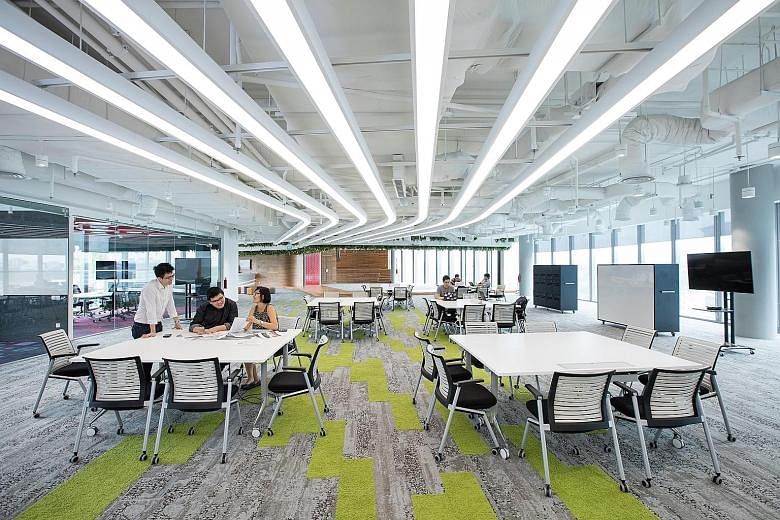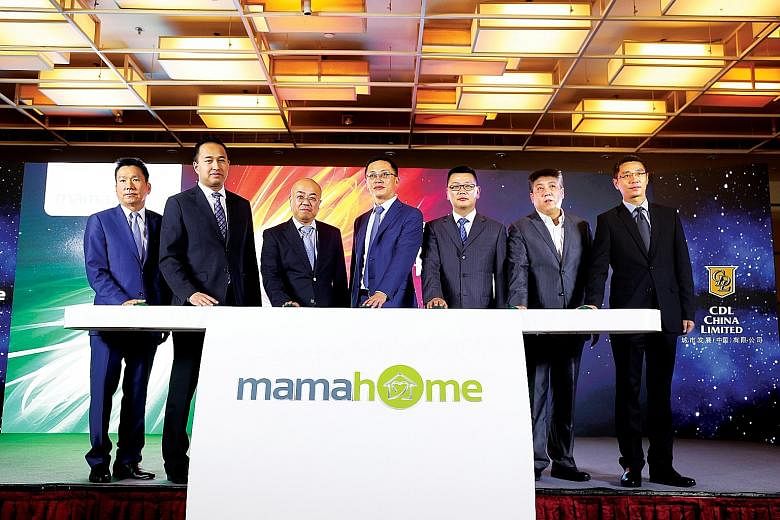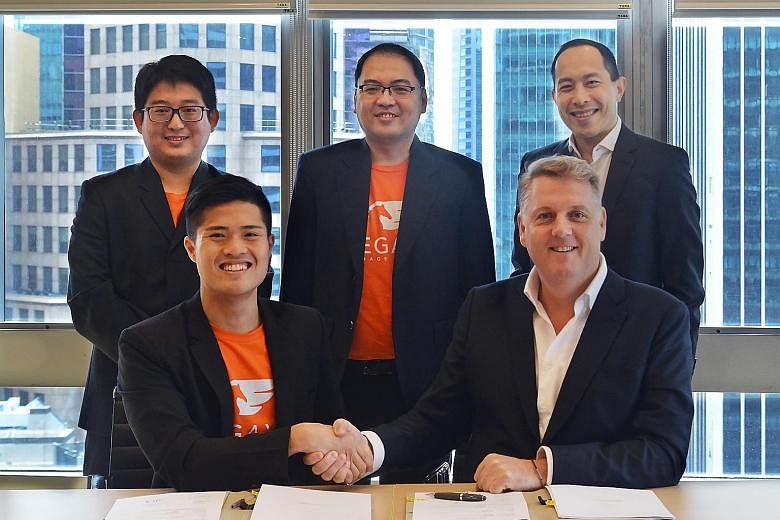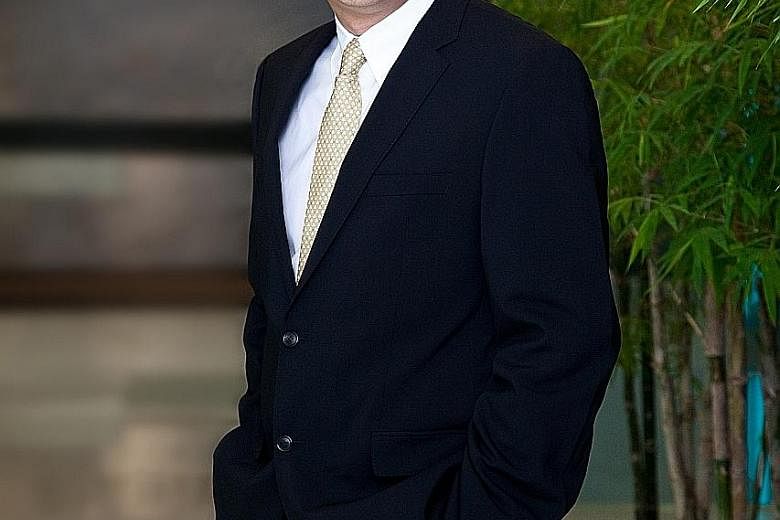Disruption was a key theme this year across industries, but incumbents which have been hit by change are not taking things lying down.
Many companies have taken the "if you can't beat them, join them" approach by investing in local and overseas start-ups. Firms are also introducing innovative services beyond their usual offerings and hiring people with different skills.
The Straits Times looks at how different sectors are tackling the challenge of disruption.
PROPERTY
Property firm Savills has put its money where its mouth is and made its first investments in start-ups this year.
Mr Christopher Marriott, chief executive of Savills South-east Asia, tells The Straits Times: "Savills has been tracking real estate tech for some years, with the first investment proposals in Asia having been made two to three years ago and the first actual investment in Singapore coming at the end of 2016 with Pegaxis, and in the middle of this year in Britain with Yopa ."
Pegaxis is a home-grown online business-to-business platform for property maintenance services - set up by former corporate lawyer Ted Poh and his co-founders - and Yopa is a British fixed-fee estate agency.
Last month, Savills increased its stake in Pegaxis from 8 per cent to 15 per cent, valuing the company at about $2.2 million.
Mr Marriott says Pegaxis "targets a key component of our property management services, namely the procurement of repairs and maintenance services within MCST buildings". Condominium management corporations are commonly known as MCSTs.
Mr Marriott says Pegaxis' software creates more efficient ways to procure services in a transparent and compliant fashion.
"The real opportunity is for us to assist Pegaxis in developing their product into the Asia region by introducing and incorporating it into our broader portfolio.
"While we may be the largest managers of MCST blocks in Singapore, our local portfolio is dwarfed by our Asia-Pacific portfolio of close to 2 billion sq ft of properties managed - this is the holy grail which will revalue their company from a couple of million to hundreds of million," adds Mr Marriott.
Savills is itself keeping up with the times. Mr Marriott says the firm's South-east Asian businesses are digitising their residential agency platform and services delivery, including a customer service app for residents in buildings managed by Savills. He adds that the business has invested close to £10 million (S$18 million) this year, "which equates to just under 10 per cent of our 2015 profits".
Mr Marriott also says the company is keen to investigate areas relating to artificial intelligence (AI) and big data.
"With regard to AI, we are especially interested in the areas of lease management and building performance management, so as to reduce the cost of management and enhance performance."
Property giant City Developments Limited (CDL) made its first investment in a technology start-up in 2012, through a subsidiary, taking a controlling stake in a United States start-up known as Whiteboard Labs, which was eventually merged with an existing company within the fold, says CDL deputy chief executive Sherman Kwek.
Whiteboard Labs owned a central reservations system that stores and retrieves information, and conducts transactions related to air travel or hotels, for instance.
Mr Kwek says the system is used by more than 2,000 hotels and the total transactional volume that passed through it exceeded US$1 billion (S$1.4 billion) this year.
In September, CDL also invested 100 million yuan (S$21 million) for a 20 per cent stake in mamahome, one of China's fastest growing online apartment rental platforms.
Mr Kwek says: "mamahome represents an efficient manner to grow market share in regional markets. It can also serve as a good platform to enhance leasing efforts for CDL's residential leasing properties and serviced apartments."
CapitaLand's serviced residence arm, The Ascott, invested US$50 million in Tujia, an online apartment-sharing platform dubbed China's Airbnb, last year.
A joint venture was also set up, allowing Tujia to hand over some of its offline properties for Ascott to manage, showing that such partnerships often lead to win-win situations.
FINANCIAL INSTITUTIONS
Banks and insurers have been steadily investing in their own technology and start-ups, as they try to stay ahead of the curve.
At the inaugural FinTech Festival here last month, 23 financial institutions opened their fintech labs and innovation centres to visitors.
One of the latest was DBS Bank's Asia X fintech facility at one-north, the newest spot for its staff and start-ups to explore financial technology ideas.
DBS has spent $5 billion in the past six years on IT and innovations and wants to improve in areas of online and paperless customer engagement.
Foreign names like Standard Chartered are also going big on technology, with the bank having IT-related expenses of about US$840 million last year and expenditure set to exceed US$1 billion this year.
British insurer Aviva set up its new digital facility in Armenian Street earlier this year, after setting up the first such facility in London last year.
The company's global annual investment in such facilities and other technology-related activities - including in Singapore - is more than US$150 million, it previously said.
Last year, AIA tied up with Nanyang Technological University to set up Edge Lab, an innovation centre, to discover consumer-centric solutions.
ACCOUNTANTS
Accountants are often seen as staid and traditional, but big and small firms alike are now offering services beyond auditing and slowly switching things up.
This can be seen in the changing workforce profile of Big Four firms like EY.
Mr Max Loh, EY's Asean and Singapore managing partner, notes that 48 per cent of the firm's Singapore workforce are accounting practitioners, compared with 58 per cent five years ago.
After accounting professionals, tax practitioners - including law practitioners - are its next largest group of professionals, making up close to 20 per cent of EY's Singapore workforce.
The rest of its staff include business and transaction advisory professionals and those in support functions.
Mr Loh adds: "Over the past years, we have brought in more non-accountant practitioners with skills in areas such as analytics, cyber, digital and strategy, operations and risk consulting, to augment those of our existing professionals such that we have the full complement of skills and capabilities to meet the needs of our clients.
"Globally, EY is driving growth through strategic acquisitions to bolster services we offer, including law, cyber security and analytics."
For instance, EY has committed to a US$500 million multi-year investment in data analytics.
Mr Quek Shu Ping, head of people, performance and culture at KPMG in Singapore, another Big Four firm, says: "In meeting the vast and various needs of our clients, we have been increasing our service offerings, ramping up our recruitment of professionals well versed in different advisory areas. These include management consultants, data engineers, data scientists and programmers.
"A sign of the commitment to our advisory business is that more than half of 11 people admitted to the partnership in KPMG in Singapore this year are in advisory services."
The firm opened an innovation lab called Digital Village here earlier this year, to help connect businesses to start-ups.
EY's Mr Loh adds that in Singapore, the firm set up four centres of excellence, as they are called, "to provide innovative services in digital business transformation strategy, cyber security, analytics and manufacturing to companies in the Asia-Pacific region".





